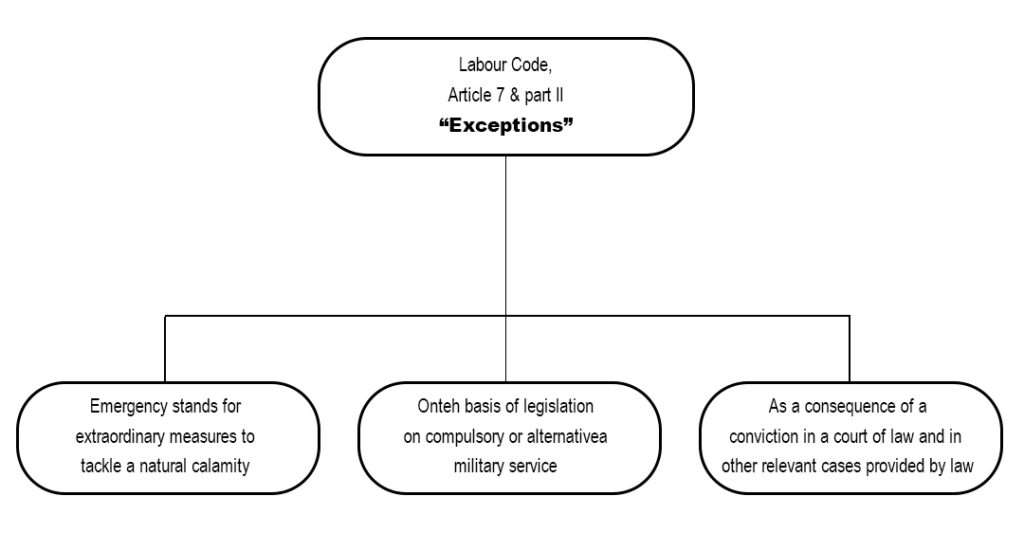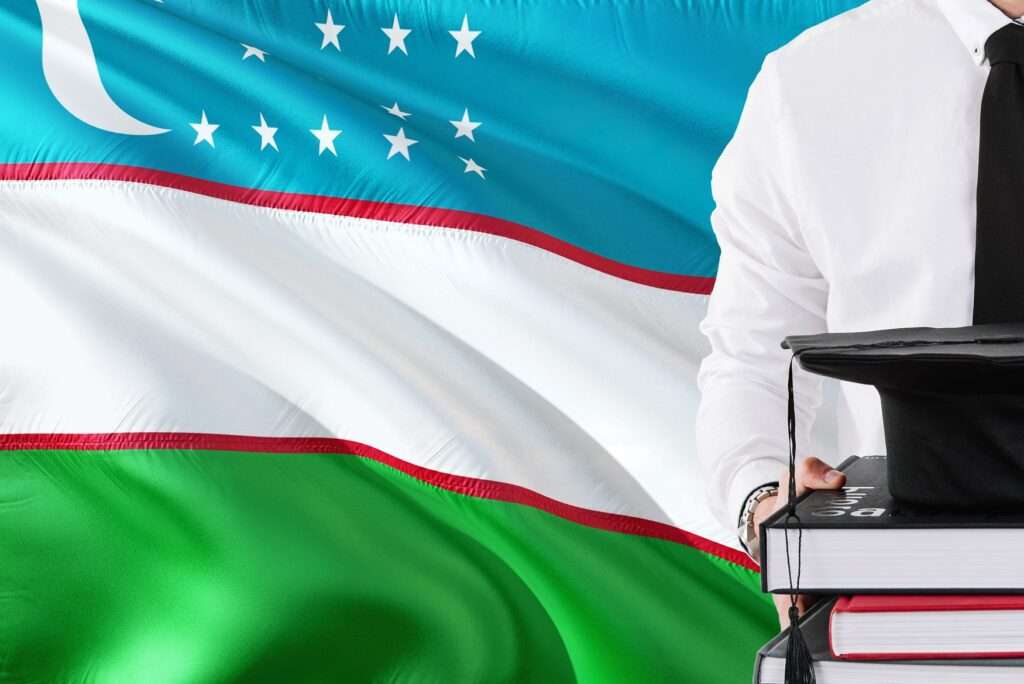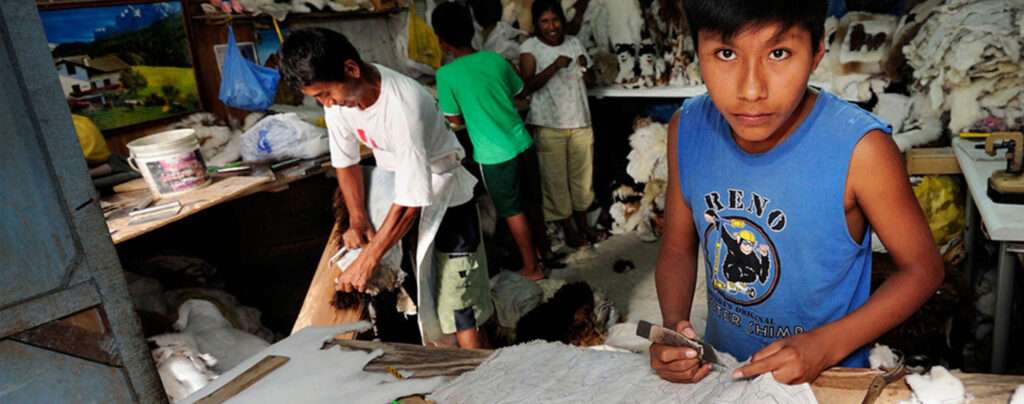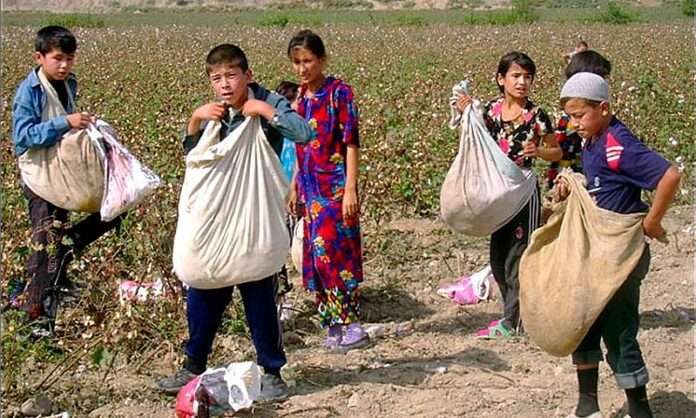According to the International Labor Organization (ILO) more than 20.9 million people around the world are still subjected to forced labor (FL) which is anti-human, societal and even anti-development. It is the complicated form of modern day slavery in different parts of the world.
ILO defines
“Forced labour is any work or services which people are forced to do against their will under the threat of some form punishment. Almost all slavery practices, including trafficking in people and bonded labour, contain some element of forced labour”.
Vestiges of slavery are still found in many parts of the world while forced labour in the form of coercive and deceptive recruitment is present in many countries of Latin America, South East Asia and elsewhere. In numerous countries, domestic workers are trapped in situations of forced labour, and in many cases they are restrained from leaving the employers’ home through threats or violence. Bonded labour persists in South Asia where millions of men, women, and children are tied to their work through a vicious cycle of debt. In Europe and North America, an increasing number of women and children are victims of trafficking for labour and sexual exploitation.
For many governments around the world, the elimination of forced labour remains an important challenge for the 21st century. Not only is FL a serious violation of a fundamental human right, it is a leading cause of poverty and a hindrance to economic development.
Uzbekistan’s Integrated Legal Measures against Forced Labour
The Republic of Uzbekistan has already taken different diversified but integrated legal measures to curb the curse of FL which is now paying its socio-economic dividends. It has been center of humanity, respect, freedom and knowledge for so many centuries which is still reflected from its legal measures against FL. Its constitution is custodian of human freedom and guarantees concept of “free-choice” and association.
Uzbekistan’s and ILO
Keeping in view the importance of human rights, free choice for all and respect for laborer classes the Republic of Uzbekistan joined the International Labor Organization (ILO) in 1992. Since then it played an active role in proposing and implementing different protocols/ conventions/programs/laws of at the ILO. More precisely, it joined 13 ILO Conventions, including fundamental Conventions concerning Forced or Compulsory Labour No.29 and the Abolition of Forced Labor No.105 in 1992. It also rectified fundamental Conventions on Minimum Age Convention No. 138 and Worst Forms of Child Labour Convention No. 182.
Role of Charismatic and Human-Friendly Leadership of H.E. Islam Karimov
The government of Uzbekistan under the leadership of H.E. Islam Karimov initiated different comprehensive administrative and legal measures to implement ILO Conventions. Subsequently, prevention of “forced labor” mechanism was introduced and implemented due which it has been on the right track and getting improved by each passing day since its inception.
Uzbekistan Constitution “Labor Code, Law on Employment”
Its Constitution “Labor Code, Law on Employment” prohibits the use of forced labor. Article 7 of the Labor Code stipulates that forced labor, namely compulsion to perform a work under the threat of some form of punishment including as a means of labor discipline is prohibited.
The Labour Code Article 7 & part II
According to above mentioned Labour Code, article 7 & part II there is a list of exceptions to this rule. A work is not considered as forced labor if it is required:

The above diagram clearly shows that these provisions are in full compliance with the ILO Conventions on forced labor.
Moreover, different legislative measures of Uzbekistan establishes the minimum age for admission to employment, the list of activities and work prohibited for children under the 18 years of age, compulsory education for 12 years, banned forced labor and human trafficking.
Combating Human Trafficking
According to the Law of Uzbekistan “On combating human trafficking” forced labor or services referred to the exploitation of people and are classified as human trafficking. In accordance with Article 135 of the Criminal Code of Uzbekistan, trafficking is punishable by imprisonment for a term of 3 to 5 years; the same action committed under the threat of coercion shall be punished by imprisonment for a term of 5 to 8 years.
Utility of Article 77 of the Labor Code
Article 77 of the Labor Code provides the minimum age for admission to employment as 16 years of age, in exceptional cases, with the permission of parents or their substitutes shall be employed from 15 years of age. In July 2009 the Ministry of Labour and Social Protection of Population and the Ministry of Healthcare issued a new edition of the “List of hazardous types of work prohibited for persons under 18 years of age”. According to this list it is forbidden to recruit persons under 18 years of age in 34 production sectors, in particular, they are not allowed to take 1673 specific professions.
Legislations of Punishment
The Uzbekistan national governance system and legislation established punishment for use of forced labor (articles 51 and 491 of the Administrative Code, articles 135, 138, 148 of the Criminal Code. It shows its high level of seriousness towards the eradication of FL in different segments and parts of the country.
Combating Human Trafficking
According to the Law of Uzbekistan “On combating human trafficking” forced labor or services referred to the exploitation of people and are classified as human trafficking. In accordance with Article 135 of the Criminal Code of Uzbekistan, trafficking is punishable by imprisonment for a term of 3 to 5 years; the same action committed under the threat of coercion shall be punished by imprisonment for a term of 5 to 8 years.
Uzbekistan’s National Action Plan (UNAP)
The Republic of Uzbekistan adopted the National action plan (UNAP) to implement the ILO Conventions on forced labor. As a responsible member of ILO it regularly submits different implementation reports of FL to the ILO.
Establishment of Interagency Working Group
To implement the recommendations/policies and programs of the UNAP an Interagency Working Group (IWG) for reporting on ratified ILO Conventions and a Coordination Council on child labor and other related issues was established in Uzbekistan. It checks to prevent use of forced and child labor throughout Uzbekistan.
State Labour Inspection
Uzbekistan has one of the most modern and effective model of state labour inspection and social protection in the Central Independent States (CIS). It has clear vision to observe and implement the UNAP on FL in the country. Social protection of labour force is the prime concern of Ministry of Labor and Social Protection. It cares about rights of the labour forces and inspects to prevent the FL in the country. To check the easy and smooth implementation of the different policies/programs the government of Uzbekistan also introduced the parliamentary oversight over the implementation of ratified international instruments, including the ILO Conventions.

Role of Trade Unions Federation of Uzbekistan
Trade Union (TU) is the custodian of the rights of labour force. It provides necessary comfort-zone to the labour force against any kind of exploitation, violation and coercive and deceptive recruitment. It has been conducting regular independent public monitoring of forced and child labor during cotton harvest since 2011. Hotlines were set up at all trade unions bodies for workers to report violations of their labor rights, including forced labor. Broad awareness raising campaigns and training activities for farmers, education institutions, local authorities and communities are carried out throughout the country.
The Council of the Federation of Trade Unions issued tens of thousands of copies of the guidelines “Uzbekistan ratified ILO Conventions” and distributed among employers and self-governing bodies through the Chamber of Commerce of the Republic of Uzbekistan and the “Mahalla” Foundation. For these purposes, the Internet has been extensively used, to which more than 10.2 million people, or one third of the total population have access nowadays.
Decent Work Country Programme for 2014-2016
A Memorandum of Understanding between the Government of Uzbekistan, Social partners and the ILO Moscow Office was signed on April 25, 2014 in Tashkent. It approved a Decent Work Country Programme for 2014-2016 with three strategic areas of technical cooperation:
| Areas | Details |
| Strengthening social partnership in Uzbekistan | Implementation of fundamental labor principles and rights at work, including a national policy on the application of international and national labor standards, national action plans on the application of Conventions on child labor ensuring that conditions of work and employment in agriculture, including in the cotton-growing industry, meet fundamental labor standards, strengthening the capacity of trade unions and employers organizations, reinforcement of tripartite social dialogue institutions. |
| Fostering decent employment opportunities | Implementation of active policies to promote full, productive and freely chosen employment, effective operation of labor market institutions, development of entrepreneurship through promotion of self-employment and support for small and medium enterprises. |
| Improving working conditions and social protection | Development of an effective occupational safety and health (OSH) management system, collective bargaining and tripartite consultations on wages, improvement of social protection. |
Chamber of Commerce and Industry of Uzbekistan
Concept of social partnership is very active in Uzbekistan. People as well as organizations believe in social partnership. It brings all desired goals of societal vibrancy and economic prosperity in the different sectors of human survival and industrial production. Strong social partnership between the Trade Unions Federation and Chamber of Commerce and Industry of Uzbekistan regularly bring to the attention of the Government their proposals and recommendations on improving the labor conditions in the country.
The labor relations are covered by a general agreement between the Government, trade unions and employers, as well as other 86 sectorial and 14 territorial agreements. The working conditions at enterprises and organizations are regulated by more than 93 thousand collective agreements, which cover today 96 percent of all legal entities employing trade unions members.
Importance of Collective Agreements
All collective agreements contain provisions on observance of labor rights, including protection from forced labor in accordance with the ILO Convention No. 105. The collective agreements also specifically provide that workers called upon to participate in agricultural works are paid for the work they perform and, at the same time, continue receiving the average wage for their usual job.
Council of Farmers of Uzbekistan
The Council of Framers of Uzbekistan (CFU) is doing a great job to protect the rights of labor force in the agricultural sector. It provides an extensive outreach to farmers to increase their awareness of compliance with national labor legislation and international labor norms.
Employers Association and Civil Society Institutions
The employers association and civil society institutions jointly play active role to reinforcing labor standards and their application in practice in the country. They both act as watch-dogs and take care about the rights of labor force.
Moreover, the Cabinet of Ministers of Uzbekistan issued a Decree on “Additional measures to implement the ILO Conventions ratified by the Republic of Uzbekistan in 2014-2016” on May 27, 2014.
It provides for a wide range of actions aimed at reinforcing observance of international labor norms, in particular adoption of a law on social partnership, new edition of the law on protection of labor, amendments to the current legislation to improve labor norms for women and youth, cooperation with IPEC, organization of national monitoring activities on the basis of the ILO methodology, conduct of awareness raising campaigns on international labor standards, strengthening the capacity of state labor inspections, improvement of labor conditions and recruitment mechanisms, including creation of an institutional basis for free hiring of cotton pickers by farmers through the labor market, training activities, translation and publication of the relevant ILO Conventions and guidebooks in the Uzbek language, etc.
Legal Measures against Child Labour
Since its inception Uzbekistan introduced a comprehensive protection and promotion of children’s rights program including the creation of conditions for their harmonious development and education. It has been identified as one of the main priorities of the state policy. A systemic work on ensuring the rights of children both at the legislative and institutional levels is carried out in Uzbekistan.
Uzbekistan and UN Convention on the Rights of the Child
Uzbekistan is one of the first countries in the region to have ratified the UN Convention on the Rights of the Child and other fundamental international legal instruments, consistently carries out comprehensive measures to fulfill its commitments on the prevention of forced labor and the worst forms of child labor.
Integrated Measures
According to an official figure more than 15 legal documents have been promulgated including the Law “On guarantees of the rights of the child”, the National Program of Action for Child Welfare, the National Action Plan to combat human trafficking, the National Action Plan to implement the ILO Conventions on minimum age and worst forms of child labour are being implemented.
Uzbekistan has also adopted the law on “Social Partnership” On 24 September 2014 and planned to adopt several draft laws related to the protection and promotion of the rights of the child. A law “On protection of children from information that has harmful effects on their physical and spiritual development” has been revised.
Ombudsman for Children
Currently Uzbekistan has established the conceptual basis for the introduction of Ombudsman for Children; a draft law “On Ombudsman for Children” has been prepared and passed necessary public and international expertise. It is carried out by the Institute of Ombudsman and its offices in the regions, representatives of international organizations such as ILO and UNICEF, and various NGOs involved in the protection of the rights of children and youth.
The Code of the Republic of Uzbekistan
The Code of the Republic of Uzbekistan on administrative responsibility contains an article on the responsibility for the use of child labor in adverse working conditions that may harm the health, safety or morals of a minor. The responsibility of employers for violation of labor legislation and labor protection of minors has also been increased.

Collective Efforts
In order to coordinate the activities of state authorities to ensure the protection of children’s rights in Uzbekistan several government agencies have been established including Commission for Minors, National Center for Social Adaptation of Children, the National Interagency Commission on Combating Human Trafficking, the Coordinating Council on Child labor, the Interagency Working Group on the implementation of ILO Conventions and others.
Uzbekistan’s Cooperation with International Partners
As part of the UN Global Campaign a wide range of awareness raising activities in the field of protection of children’s rights are being carried out. In close cooperation with international partners such as UNDP, UNICEF, UNESCO, ILO, OSCE, ICRC and others over 120 major international instruments on human rights, including Convention on the Rights of the Child and its two Optional Protocols, the ILO Conventions on child labor have been translated into Uzbek and published in large quantities.
International Ranking
Keeping in view Uzbekistan’s initiatives for the protection and promotion of children the international organization “Save the Children” ranked it 9th out of 161 countries in 2012 among the best healthcare for children. It reconfirmed its strong political commitment towards the welfare of children in the country.
The government of Uzbekistan has been engaged with the heads of educational centers/institutions throughout the country about their personal responsibility for noncompliance with the legislation on child labor. On the part of parents, they give a written commitment that their children will not be involved in the cotton harvest.
In some individual cases of the children being at the cotton fields, territorial monitoring groups made protocols over removal of children and with the help of labor inspectorates brought them to the administrative responsibility.
The Special Commission
The government of Uzbekistan has also established the office of the Special Commission on Affairs of Minors of the Cabinet of Ministers headed by the Prosecutor General of the Republic of Uzbekistan. It is responsible for addressing almost all matters related to the situation of children in society, including control over elimination of the worst forms of child labor.
Formation of Coordination Council
The government of Uzbekistan has also formed the Coordination Council on Child Labour. It is headed by high ranking officials of the Federation Council of Trade Unions, the Ministry of Labour and Social Welfare, the Chamber of Commerce. It also includes representatives of relevant ministries, agencies and public organizations.
The Coordination Council plays a crucial role in the organization and monitoring of child labor in the cotton industry, organized by Uzbekistan jointly with ILO.
Uzbek Government’s written Protocols
The government of Uzbekistan issued a written protocol instructions to all involved organizations, including hokims, heads of educational institutions and other organizations on the inadmissibility of mass-involving of children under 18 years of age to the cotton harvest, as well as forced mobilization of workers, without their voluntary consent, by applying harsh penalties in the case of violations the relevant legislation.
All secondary specialized vocational education institutions functioned during the season of the cotton harvest. The average percentage of attendance of students of academic lyceums and professional colleges made up 91 percent.
Moreover, most of the cotton was cultivated and processed during 2014 by the private producers and the State had no role to play.
According to Article 2 of the Forced Labour Convention № 29, hiring workers on a voluntary basis to cotton works cannot be considered as forced labour, as workers have the right to terminate their employment at any time, if there is a situation of compulsion.
In order to protect citizens’ labour rights, “hotlines” have been launched and operate under the Council of the Federation of Trade Unions, regional councils of trade unions and territorial associations of trade union organizations. 1994 citizens’ appeals were received in 2013 and 2048 in 2014, which were given legal advices. However no complaints related to the use of forced labour and the worst forms of child labour in cotton works have been filed. It should also be noted that in 2013-2014 there have not been any claims to the courts on forcing by authorities to attend of business organizations in the cotton works.
It would be right to say that members of farmers’ and workers’ families wish to get additional income, which is not prohibited by current law. Moreover, in 2015 Uzbekistan declared “The Year of Care for the Senior Generation” and adopted a State Program, which envisages a complex of measures aimed at improving the health of elder people and to improve the service provided for them. 2246.5 trillion Uzbek soums were allocated for the implementation of the Program.
Conclusion
The Republic of Uzbekistan fully supports the International Labour Organization (ILO) efforts to prevent and combat the forced labour by strengthening legal and institutional frameworks, providing technical assistance to member states and encouraging international cooperation based on the principles of non-selectivity, impartiality and objectivity.
Uzbekistan is willing to further strengthen and expand an open and constructive engagement with the ILO including on eradication of forced labor in compliance with its international obligations.
The Republic of Uzbekistan under the leadership of H.E. Islam Karimov has firm commitment to fulfill its international obligations in the field of labour protection and has been rigorously engaged with the ILO for the last so many years. Since 2013 20 activities were held jointly with the ILO. The representatives of the ILO visited Uzbekistan 9 times.
Uzbekistan’s pledges to end forced and child labour in its cotton industry which is on the right track. Earlier this year, the International Labour Organisation (ILO) praised the government for monitoring the situation to ensure that children were kept out of the harvest workforce.
Slavery is not dead. It is found in the practice of forced or bonded child labour, which is considered to be the most exploitative and egregious form of child labor. It is anti-human. It is anti-development which promotes discrimination. It debars angles of nature from their basic rights of education, food and medication.
The Republic of Uzbekistan has been advocating true spirits of freedom, respect of humanity, love, dignity and free choice for so many centuries. Its renowned scholars promoted the importance of free society, equality and care of its people. Uzbekistan has already taken all possible administrative and legal measures to cope with the socio-economic issues of forced and child labour.
Despite all western propaganda and slanted stories incidents of forced and child labour has diminished throughout the country. Comparative advantage has been shifted from agriculture to massive industrialization due to which share of cotton has already been marginalized. Better mechanism and multilayered implementation of National Action Plan is now paying its dividends.
Comprehensive legislations have been promulgated against forced labour and constitution guarantees the rights of children. Every country has its own independent organ (legislative) of state which cares about the basic rights of its people but exemptions are there to be followed and implemented.
Moreover, at the initiative of President Islam Karimov, 2014 was declared the Year of the Healthy Child in the Republic of Uzbekistan. A State programme entitled “Year of the Healthy Child” was adopted. It was a logical continuation of a socially oriented public policy whose priority since the earliest days of Uzbek independence has been to raise a younger generation that is harmoniously developed, physically healthy and spiritually mature. It showed the strong commitment of the government for the welfare of its children and youth.
The International Labour Organization (ILO) permits certain relaxations in dealing with the forced and child labour which must not be taken as the violation of its protocols. Children and youth of Uzbekistan are the hope of its further socio-economic prosperity and political maturity which must be tapped with tenderness and better education, health, job creation and the government of Uzbekistan is on right track to cope with the all socio-economic ills of forced and child labour.




